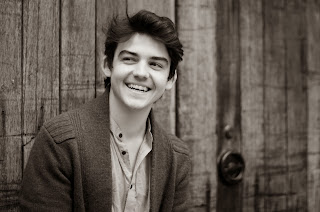I met up with Harry Ogg to talk about Sinfonia d'Amici and forthcoming performances. But before we talk of Sinfonia d'Amici, our conversation touches further on Ogg's recent debut with the Halle performing the scores which Britten wrote for the wartime films, An American in England. The recording came about as a result of Ogg's work assisting Mark Elder in act three of Parsifal, and represented his debut conducting a professional orchestra. He describes it as a steel learning curve, but it was clearly a challenge that he relished.
Like Ogg, the players of Sinfonia d'Amici are all just leaving college and spreading their wings in the professional world. That the orchestra is developing a reputation is indicated by the fact that this year, they have been giving concerts in concert halls rather than churches for the first time. In September they gave a concert at LSO St Lukes, combining Mozart's Overture to The Magic Flute, Strauss's Oboe Concerto and Haydn's final symphony with a new commission from Josephine Stephenson. The idea behind the programme was to perform the works by Mozart, Strauss and Haydn which come at the end of the composers' life but which Ogg feels have a unique jollity about them. The new work by Stephenson was about the evening, intended as being complementary.
In April, Ogg conducted Sinfonia d'Amici in a concert performance of Humperdinck's Hansel und Gretel with Maud Millar as Gretel, Rosanna Madylus as Hansel and Ben McAteer as Father, complete with a children's choir. When I ask Ogg about the rationale of performing opera in concert, he says that he sees opera as a way of developing the group's ensemble playing, that the players cannot ever be not listening and that they have to think about the drama.
I then ask why choose La Boheme for their next opera, and Ogg laughs and retorts Why Not? He says that the opera is what Mark Elder calls a Monday Nighter, you can put it on on a Monday night and still get a full house. Ogg describes it as something needed in the cold before Christmas, and a youthful cast will bring a youthful directness and energy into their performance. Talking about the opera, Ogg refers back to Murger's original novel on which the opera is based, it is clear that he has been doing his homework. He talks of the young men in the opera falling in love and growing up during the course of the opera's events. For Ogg, too many performances are rather heavy and over-indulgent, with the feeling of the performers looking back. Ogg will be working with a cast of recent graduates, and they will be bring out in the opera all that excitableness and the sense of young people finding something new.
The cast for La Boheme will include Oliver Johnston and Sara Lian Owen, both of whom have been working at Glyndebourne. Gareth Brynmor John, who plays Marcello, recently won the Kathleen Ferrier Prize and Maud Millar, who plays Musetta, has been performing at Opera Holland Park as well as singing Gretel in the Sinfonia d'Amici Hansel und Gretel.
Typically the orchestra does around two to five concerts per year, depending on availability and finances, and they did tours to France in 2011 and 2012. But as the players get older, finance becomes more of an issue, as the orchestra needs to find the money to pay them. The orchestra has been developing relationships with sponsors as well as programming concerts which Ogg feels that people will want to come to. In his concert programming, Ogg intends to mix the interesting and the attractive with something slightly different in each concert.
Further ahead, the orchestra will be returning to LSO St. Lukes on 21 April for a concert which includes Stravinsky's Petrushka and Brahms's Violin Concerto. The one Ogg sees as a showpiece for the orchestra, the other a showpiece for the soloists, and whilst both works are different Ogg sees them as both being highly structured.
Ogg himself will be busy from January in his new role with English Touring Opera, where he will assist conductors and coach singers. There will be a lot of piano playing and learning repertoire, both of which Ogg sees as important. And he sees the piano playing as important in keeping him in touch with the music, and that playing piano with singers is a significant role for a young conductor.
During our conversation Ogg has also mentioned various symphonic works that mean a lot to him, so I ask him whether as a conductor he wishes to work predominantly in opera or in symphonic music. He quotes Carlos Kleiber, who once advised a young conductor to work in opera as it was the best place to learn technique. For Ogg, the work of opera with its theatre, drama and whole scale collaboration is really exciting and he would like opera to form a huge part of what he does.
Sinfonia d'Amici will be performing Puccini's La Boheme at Cadogan Hall on 18 December, further information from the orchestra's website and tickets from the Cadogan Hall website.
Elsewhere on this blog:
- WIN a copy of Music: The Definitive History our latest Competition
- Sheer Magic - Felicity Lott's farewell recital at the Wigmore Hall
- Future Tense? OMTF's conference looked at opera in 2030.
- Amore e Morte - Ekaterin Siurina - CD review
- A mid-Autumn night's dream with the Brodsky Quartet
- Spectacular Magic Flute at the London Coliseum
- Emmanuel Despax in concertos by Stephen Goss, Saint-Saens and Franck - CD review
- Ceremony and Devotion - The Sixteen at Temple Church
- BREMF: Profane Delirums - L'Avventura London
- Christiane Karg - Wigmore Hall Live - CD review
- Journeying Boys - Guildhall School
- Taking Music Further - Orchestras Live conference
- Giorgio Berrugi at Rosenblatt Recitals
- Home




%20and%20kids.jpg)
.webp)



.jpg)


No comments:
Post a Comment